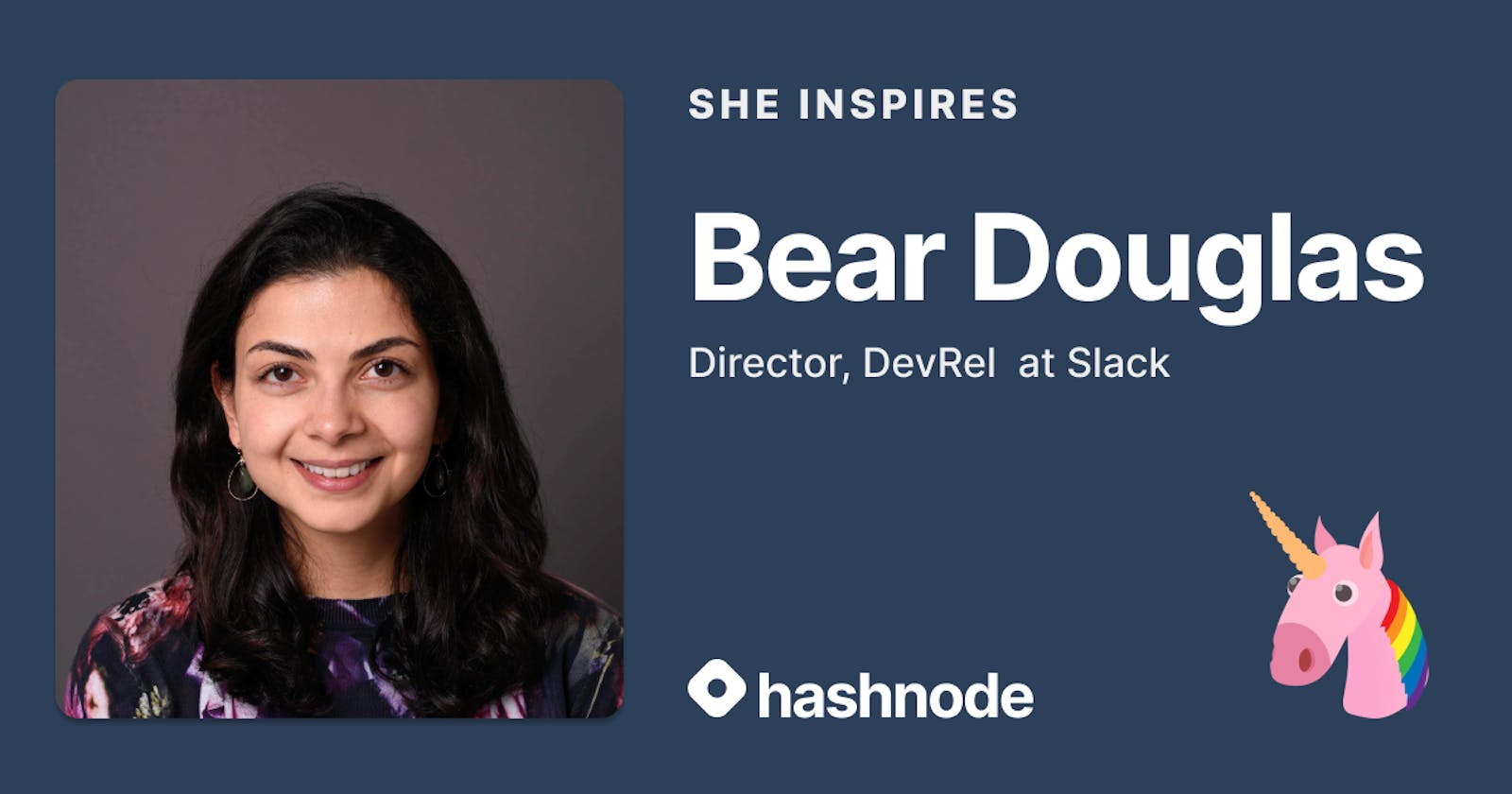Today, we have Bear Douglas 👩💻, Director, Developer Relations at Slack, where she and her team help developers build more pleasant and productive ways to work. Before Slack, she led the developer relations teams for the mobile and data platforms at Twitter and worked on native mobile developer relations at Facebook and Parse.
I'm very up front about what I don't know. Not knowing everything doesn't make you an impostor- it makes you honest.
— Bear Douglas
In this interview, you'll to learn how Bear started her career in tech, her journey so far, advice on tech and over a decade of work experience. If this interview was helpful to you, please share it with your friends and colleagues and help others 🚀💜

Please tell us a little bit about yourself. How and when did you venture into tech?
Bear: I was lucky enough to go to a school that had computer classes from first grade onward- we wrote LOGO programs and eventually graduated to C++. I didn't major in CS in college, so I came back to tech after graduation, working at a startup.
Can you briefly tell us about your job title?
Bear: Developer Relations is a role that means something a little bit different at every company. At Slack, we work on our developer docs and tools like our SDKs, as well as on programs to help developers be successful- outreach and education programs, plus running betas for our product team, reviewing changes to the APIs and advocating internally for developer needs.
What difficulties have you faced on your way in tech? Have you ever felt like you were not treated as equal?
Bear: It's usually lots of small things, like, after I gave a live coding demo, someone came up to me and said, "I didn't know girls used VIM." Sometimes, a (usually male) developer will ask me a technical question and then second-guess my answer to my face. But the people I actually work with have largely been lovely.
If there is a bias women face, why do you think it is still there, in the 21st century? What are some things people and organizations could do to change this?
Bear: Cultural change takes time, and changing biases requires a certain amount of self-awareness and self-reflection to fix at an individual level (e.g. you have to first notice that you talk over women before you can ask yourself why and then stop doing it). At an organizational level, you need similar reflections about what behaviors you reward or punish, and what you endorse by being silent– for example, if someone says, "we don't want to lower the hiring bar" in a discussion about hiring more women or PoC, does that get challenged? Who says something? If a person in the organization does good work but also does great harm by making these types of comments, do they get fired or do we make excuses for them? It's easy to say sexism (and racism, and ableism, and homophobia) are bad. What's harder is to identify the specific ways you (and I!) contribute to the continuation of racist, sexist, homophobic, ableist systems and change our behavior and our expectations of one another.
Before now, you worked at Twitter and Facebook. How was life there and how did you decide to make switches?
Bear: They were both incredible learning opportunities, working for developer communities that were truly global in scale and participation. The things that made me interested in switching roles were generally interesting new challenges (like launching Fabric at Twitter, or building the growing community at Slack).
You currently work at Slack as Director, Developer Relations, how long did it take you to arrive here and what significant difficulties did you face along the way?
Bear: I've been working in Developer Relations for just under a decade. I've led the Developer Relations team at Slack the last 2-3 years- so a while! Particularly early on, it was a challenge that I didn't have a formal CS degree- both for getting hired and then for my own sense of impostor syndrome working in this field.
We see that you work predominately in Developer Relations. How did you decide to focus on this path?
Bear: It happened a bit by accident- I was hired into a marketing role for a developer product, and a lot of my work (writing and editing technical blog posts, running meetups at the community, doing education work) matched what people in DevRel do. So when Facebook had an opening for a Developer Advocate, I felt it was a job I could do, and I made the transition then.
What advice do you have for a newbie or intermediate who dreams to work as Director, Developer Relations?
Bear: Participate in the community you want to help or represent. Particularly in the earlier years of my career, I spent a lot of time at meetups and events listening to people speak and meeting the people I otherwise only knew online. You can't lead a community until you're in it.
How long have you been in tech and what word will describe your experience so far?
Bear: A bit over a decade, hectic
We see that you speak and teach at software conferences, how did you get into public speaking and how has it affected your career?
Bear: I acted in plays in school and sang in choruses and a cappella groups, so I've always been fairly comfortable on stage. That comfort and willingness to be in front of people has been incredibly helpful.
What advice would you give to aspiring programmers who look forward to speaking at meetups and/ or conferences?
Bear: Try it out! If you are proposing talks that aren't getting accepted, try smaller venues like meetups where the organizers may be more willing or able to tell you why they did or didn't accept your proposal. There's no substitute for a real audience, so the more you speak, the more practice you get, and the easier it will be to build the skill.
What do you think needs to be done to encourage beginner developers to learn programming languages and continue learning?
Bear: Make it welcoming, and deliver early victories/moments to celebrate. LOGO was fun because there was a surprise and delight moment of being able to control the computer. Building websites in high school was fun for similar reasons- you could interact with the output. Teaching people in a space where they know they can ask questions without being made fun of or talked down to is key.
Imposter syndrome is one problem developers face especially newbies, what is your experience with imposter syndrome, how did you manage yours, and what advice do you have for anyone facing this currently?
Bear: My early strategy for managing impostor syndrome was to fake it 'til you make it. When I had just learned Android programming, I committed to doing an "Advanced 201 deep dive" into Facebook's SDK architecture at an Android conference. I worked my butt off to learn what I needed to do to make a good talk and speak credibly about it. The impostor syndrome helped motivate me to learn. Now, I do the opposite- I'm very up front about what I don't know. Not knowing everything doesn't make you an impostor- it makes you honest.
Rejection emails are another thing that motivates imposter syndrome and depression amongst developers, especially intermediates. How did you manage this effectively during your "job-hunting" days?
Bear: I actually tried to A/B test some of the stories I was telling in job interviews to see if different messaging resonated better. It took a lot of interviews (I think I did about 30 before landing at Facebook), but I treated each interview as a moment to do data collection. If I got rejected, something about my story didn't work. Adjust strategy and try again.
What advice would you give to aspiring programmers who look forward to working for companies like Slack or Twitter.
Bear: Make the most of the learning opportunities you have where you are right now- in a small company, you have a chance to take on lots of responsibility. In a big organization, you can learn how you need to coordinate work with large groups of people to work efficiently and well.
Which of your projects are you most proud of? Can you briefly introduce us to it and why you built it?
Bear: docs.fabric.io has been sunsetted now (it's part of Google Firebase) but I was proud to have created the docs site from the ground up with my team. Most of what I'm proud of, as a manager, are the things my team has been able to accomplish- like Slack's app framework, Bolt. I didn't write any of Bolt, but I'm proud to work with and for the people who did.
What is the best advice someone has given you that has helped you in your career?
Bear: Whenever you're at a company, you should have an advocate (whether it's your manager, or their manager, etc.). If you don't have any advocates, it's time to go.
What are your favorite programming tools?
Bear: I like a bunch of IDEs for different reasons- I loved using Eclipse for Java apps and in the old days of Android, I appreciate the slickness of Xcode's features like autolayout and easy tab completes. I like Atom and even use it just for taking notes.
What does your development environment look like?
As a manager of managers, I'm not writing much code these days- and you probably don't want me mucking around!
Finally, what would be your message to women trying to get into technology?
Bear: There are lots of us in tech already, and we're here to help you!
Thanks for taking out time to read this interview. 👋
This series is all about talking to the awesome women in tech, understanding the current health of the tech industry and inspiring other women to become better. If you want to share your story, please reach out to me on Hashnode.
Did you find Bear's story useful and inspiring? Write down your thoughts in the comments section below and don't forget to share this interview. You can also follow Hashnode on Twitter to stay up-to-date with our future She Inspires interviews.
See you next time and keep trailblazing 💪💙

